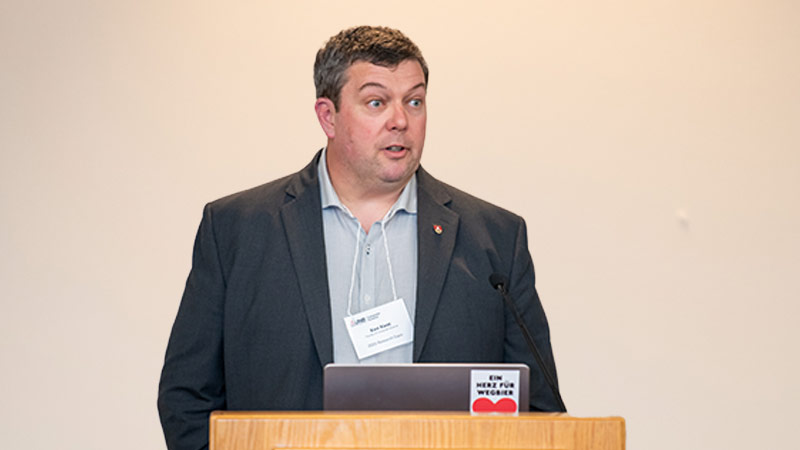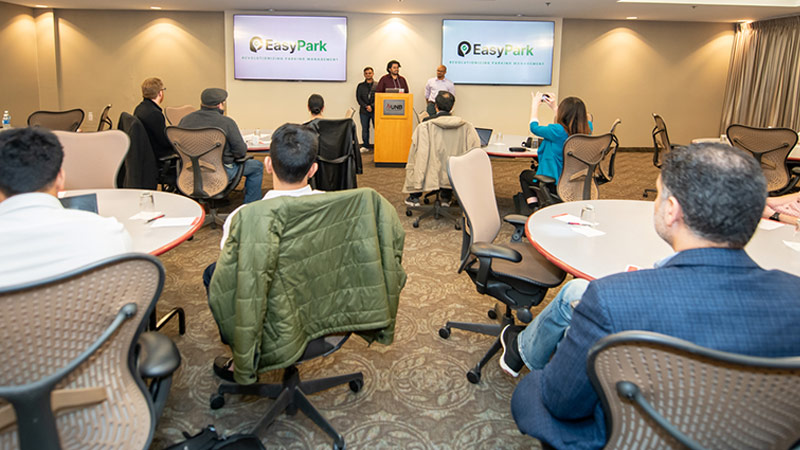UNB courses inspire computer science students to embrace entrepreneurship
Author: Tim Jaques
Posted on Jun 4, 2025
Category: UNB Fredericton

Under Dr. Kenneth Kent’s leadership, computer science students are learning to blend technical expertise with entrepreneurial vision. Two new courses aim to spark innovation and economic growth, preparing students to launch start-ups or bring fresh perspectives to existing businesses.
A new academic initiative at the University of New Brunswick’s (UNB) Fredericton campus encourages computer science students to think beyond code toward entrepreneurship.
The Barrett Chair in Entrepreneurship for Digital Transformation, held by Dr. Kenneth Kent, is reshaping how students approach technology by embedding entrepreneurship into their education.
New Brunswick business leaders and entrepreneurs Edward (Ed) and William (Bill) Barrett funded the creation of the chair to promote entrepreneurship in the technology sector. It is based in UNB’s computer science faculty, and the McKenna Institute helped establish the chair.
While other UNB faculties offered entrepreneurship programs, computer science did not. The goal was to encourage students to think about building businesses, not just acquiring digital skills.
“It is to try to help boost and grow the economy and New Brunswick’s and Atlantic Canada’s prosperity,” said Dr. Kent.
Dr. Kent who has been a professor within the faculty since 2002 brings academic, industrial and entrepreneurial expertise to the chair position with industry collaborations and experience as a start-up co-founder. In 2020, he was named the New Brunswick Innovation Foundation (NBIF) R3 Star Mentor of the Year.
“If you look at the start-ups and entrepreneurship happening in New Brunswick, particularly in Fredericton, a lot is based on the IT sector.”
Dr. Kent developed Entrepreneurship for Digital Transformation I and II to support that mission. The first course launched in fall 2024 and the second in winter 2025. Both are aimed at senior undergraduates and early graduate students.
“In computer science, we tend to focus on technology,” Dr. Kent said. “What we envisioned here was getting the students to think about how computer science and business intersect.”
Entrepreneurship for Digital Transformation I focuses on identifying real-world problems and whether a market exists for a potential solution. Students must conduct both primary and secondary research to understand the scope of the problem and identify potential stakeholders who may be willing to pay to solve it.
Dr. Kent said students often begin with a personal observation but must test it in the field.
“It is not just simply saying, ‘I observe that this is slow, and I can make it faster,’” he said. “They are required to talk to a potential customer and understand their problem.”
One student, inspired by his mother’s difficulty connecting with him online, visited a long-term care home to see if others faced the same challenge.
Another, prompted by his lawyer father’s frustration accessing and analyzing information buried in voluminous office files and archives, researched whether other legal professionals had similar needs.
Dr. Kent encourages students to share their ideas early and form teams based on shared interests and complementary skills.
“They realize that the individual experience is a lot of work, and you need a team behind you to pull and push to get the work done rather than try to do it alone,” he said.
Entrepreneurship for Digital Transformation II builds on that. Students create a minimum viable product and return to their original contacts for feedback. Weekly meetings with the client help refine the product and ensure it addresses the identified problem.

“At the end of the term this year, we partnered with the Computer Science Research Expo,” Dr. Kent said. “The students were there to demonstrate the products they had built.”
The course culminated in a pitch event judged by representatives from Planet Hatch, NBIF, and Springboard. One student team, which addressed the legal file management challenge, has since incorporated and joined Planet Hatch. They are now working with a client who has signed a letter of intent to use and pay for the product once it is completed.
“Inspiring and building entrepreneurial sensibility and knowledge in computer scientists is critical as the world rapidly increases its digital footprint, and large societal challenges must be met with technology-enabled solutions—in healthcare, renewable energy, education and many more,” said Dr. Luigi Benedicenti, dean of the faculty of computer science.
“Donors Bill and Ed Barrett envisioned the Barrett Chair to be part of this solution by educating computer scientists who are ready for this complex future and who not only see opportunities and solutions for these large challenges but also have the technical knowledge, ability and entrepreneurial mindset to tackle them,” he said.
“Our very first cohort of entrepreneurial students have now completed two brand new practical courses taught by Dr. Kent, which resulted in impressive student-led business and social ventures that marked the beginning of their digital entrepreneurship journey. This is a significant point of pride for our faculty, and we are profoundly thankful for Bill and Ed’s support.”
Not every student leaves the course planning to launch a start-up. Some discover entrepreneurship isn’t for them, but they still gain valuable insight into how businesses operate.
Dr. Kent aims to foster stronger ties with industry. He hopes companies will bring real-world challenges to the classroom and that, in turn, students can keep businesses informed about new developments in computer science.
“New developments are happening, and companies must be apprised and updated,” he said. “These students with expertise in computer science can help them.”
Dr. Kent’s goal is to provide students with a broader understanding of building and running a tech business.
“I’m hoping that through these courses, the students get a better appreciation of how they can look at a problem or opportunity in business or society and think creatively about how a technology solution could solve it. I’d like to help them develop a more complete view of having a tech business, operating it and making it a success.”
Photo: Dr. Kenneth Kent
Photo: Students from the Entrepreneurship for Digital Transformation II course at the 2025 Computer Science Research Expo pitch event.
